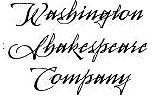
 .
.
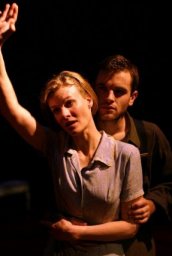 |
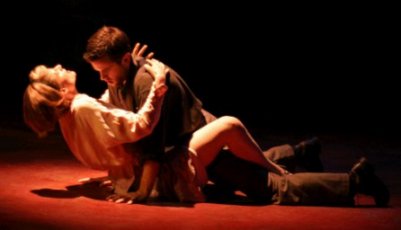 |
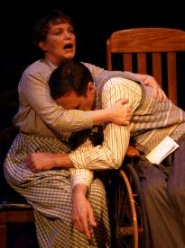 |
| Vreeke directs with ...an intriguing mix of ruefulness, repression and unbridled sensuality -Washington Times | Vreeke directs with a positively choreographic awareness of his actors' bodies -City Paper | Vreeke conjures an atmosphere that seems to emanate from some hidden place in the soul where love, hate and desire intersect -Washington Post |
Those who remember D.H. Lawrence's "Lady Chatterley's Lover" only for the sexy parts may be surprised to realize there is a lot more to the novel. Once banned for its frank depiction of sexuality and sensuality, "Lady Chatterley" is, at heart, about class constrictions and the often suffocating bonds of motherly and spousal love.
Mr. Lawrence's meditative and passionate novel deals with the benumbed and deracinated England after World War I and the emergence of "a new man" (personified by Lady Chatterley's lover, the gamekeeper Oliver Mellors) who not only transcends class, but embodies both the masculine and feminine ideals — someone who is both rough and tender.
The Washington Shakespeare Theatre's splendid production of "Lady Chatterley's Lover" brings out all these aspects, and, under the direction of John Vreeke, imbues them with an intriguing mix of ruefulness, repression and unbridled sensuality.
The adaptation was commissioned originally by the Book-It Repertory Theatre in Seattle, which performs staged readings, with the cast reciting and acting out verbatim passages from novels. When it works — as it does here, beautifully — this highly stylized approach to adaptation appeals to audiences who love drama and the written word. The literary flavor of the book is preserved, yet the evening itself is thrillingly theatrical.
 As high-minded as Mr. Lawrence's
novel and this staging
can be, let's be frank. Nobody is going to schlep to the outer edges of
Crystal
City in the middle of summer to explore Mr. Lawrence's ideas about
class,
industry and marriage. That's like saying you read Playboy for the
articles.
As high-minded as Mr. Lawrence's
novel and this staging
can be, let's be frank. Nobody is going to schlep to the outer edges of
Crystal
City in the middle of summer to explore Mr. Lawrence's ideas about
class,
industry and marriage. That's like saying you read Playboy for the
articles. Most of us are going to check out "Lady Chatterley's Lover" in the hopes of seeing something steamy. I'm happy to report that the production appeals to the libido as much as it does the intellect. The love scenes between Constance Chatterley (Michelle Shupe) and Oliver Mellors (Hugh T. Owen) pulsate with lushness and heat and awakening senses.
Onstage portrayals of sex can be awkward and false when there is no chemistry between the actors, but Miss Shupe and Mr. Owen throw themselves into the role of lovers, and every encounter is palpably believable. The sex is stylized and tasteful, almost choreographed like ballet. The production's only nude scene is not what you would expect. Instead, it's a moment when Constance and Oliver peel off their clothes and run around in the rain, as happy and unfettered and curious as children.
"Lady Chatterley's Lover" reflects a woman's point of view, as Constance eschews the life of the mind for living fully in her body. So there is nothing smutty or degrading about the sexuality in the novel or in the play — instead, there is a sense of discovery and naturalness.
Perhaps that is because, until she met Oliver Mellors, Constance's world was one of thought and talk. It was the masculine, snobby world of her husband, Clifford (Jim Jorgensen), a realm of fiery intellectual debates, reading great books and endless conversation.

Although Clifford is portrayed from the start as something of a cold fish, he actually lives in the mind because his body failed him — he is in a wheelchair after being paralyzed from the hips down, the result of a war injury. Without hope of either an heir or sexual intimacy with his wife, Clifford chooses an intellectual chumminess with Constance, a complete and utter devotion to ideas and upper-class mores.
Constance is at first pleased to be loved for her mind, but Clifford's academic bullying and smugness begins to suffocate her. There has to be something beyond words, beyond talk and duty. She finds it with Oliver Mellors, who displays aching tenderness and a crude devotion to the pleasures of the flesh.
An intoxicating combination, indeed. One that sends Constance spiraling into the modern age, where class doesn't matter and men and women strive to be equal partners both in and out of the boudoir.
Clifford, on the other hand, remains behind in his cozy concept of traditional England, dotingly tended to by Mrs. Bolton (Charlotte Akin), a bossy and gossipy nurse from the lower classes who is only too happy to treat her master like a baby. The progression of their relationship from master and servant to mother and doddering child is exquisitely creepy.
The Washington Shakespeare Company production is spare and austere, with the white drapes, wintry branches and statuary scattered about giving everything the feel of an Edward Gorey drawing — all Edwardian gloom and doom.
There is nothing subdued about the acting, however.
 Miss Shupe is both cosmopolitan
and provincial as
Constance, bearing a pained, pretty smile, so anxious to please it
hurts.
Miss Shupe's portrayal of Constance is so whole you experience the
wasting away in her marriage to Clifford as acutely as she does and you
share in
the lusty triumph of her liberation as well.
Miss Shupe is both cosmopolitan
and provincial as
Constance, bearing a pained, pretty smile, so anxious to please it
hurts.
Miss Shupe's portrayal of Constance is so whole you experience the
wasting away in her marriage to Clifford as acutely as she does and you
share in
the lusty triumph of her liberation as well. Mr. Owen, as Oliver Mellors, embodies the nature-loving stud without descending into stereotypical macho posturing. His Oliver is a lovely man, inarticulate and blunt, but possessing a silvery soul. His counterpart, Clifford Chatterley, is played with delicate sadness and shadow by Mr. Jorgensen.
Nanna Ingvarsson lightens things up with her confident, often comic, air as Constance's definite sister Hilda. Another strong, but never strident, personality is brought to life by Miss Akin as the no-nonsense Mrs. Bolton.
The Washington Shakespeare Company should be commended for bringing this terrific adaptation to local audiences. It is not often you see a novel brought to the stage with such fine focus and devotion to the author's intention.
***1/2
WHAT: "D.H. Lawrence's Lady Chatterley's Lover" adaptation by Mary Machala and John Vreeke
WHERE: Washington Shakespeare Company, 601 Clark St., Arlington
By Jane Horwitz
Special to The Washington Post
Tuesday, May 11, 2004; Page C05
Strong visions fueled director John Vreeke as he staged "Lady
Chatterley's Lover" for the Washington Shakespeare Company.


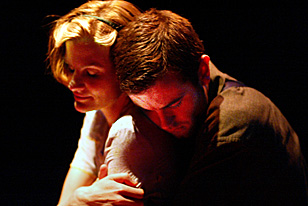
Lady Chatterley's Lover There's nothing like upheaval to make a people question its values, so the opening sentences of Lady Chatterley's Lover ought to resonate with American readers as never before: "Ours is essentially a tragic age....The cataclysm has happened, we are among the ruins." That sentiment gets spoken aloud in Mary Machala and John Vreeke's stage adaptation for the Washington Shakespeare Company, which divides much of the book's omniscient-third-person narration among the various characters; they'll describe what they're feeling, what they're going to do, how their individual awakenings or retreats play out in that vast, ugly house next to that choked coal-mining town. The effect is somehow novelistic and cinematic at once, and yet it's by no means untheatrical; all the stylization concentrates the story's power, demands a certain focused attention from the audience. Vreeke directs with a positively choreographic awareness of his actors' bodies (an apt approach to a text that celebrates the "unspeakable motion" of its heroine's sensual skin-shedding); Michelle Shupe anchors the production with a performance of enormous poise; Jim Jorgensen, as her invalid husband, lets us see the man's gradual hollowing-out and insists that we understand it; and Charlotte Akin is all charity and warmth as the working-class woman who talks sense to them both. Hugh T. Owen is occasionally strident as the gamekeeper who sparks Lady Chatterley's emergence from her Edwardian chrysalis--but then he's the one this adaptation asks to voice most of Lawrence's bitter social critiques. When he stops growling about injustices and moves with Shupe through one of those intensely personal tangos, he's charismatic enough to make you forget the politics. (TG) Washington Shakespeare Company's Clark Street Playhouse 601 S. Clark St., Arlington.

Love, Hate, Desire Boil Over in 'Lady Chatterley'
By William Triplett
Special to The Washington Post
Friday, August 1, 2003; Page C07
You might have thought that Ken Russell's movie of "Women in Love" made a fair case that D.H. Lawrence's intensely narrative-driven novels really can't be dramatized both faithfully and engagingly. Lawrence's power lies in acute perceptions observed through blood-gorged, florid prose contrasted against mostly banal dialogue. And as the 1969 film demonstrated pretty convincingly, if unintentionally, Lawrence's prose doesn't translate directly into theatrical terms, while the dialogue, alas, does.
Fortunately, John Vreeke and Mary Machala take a different tack in their stage adaptation of Lawrence's notorious "Lady Chatterley's Lover," currently playing at Washington Shakespeare Company in a mysteriously absorbing production. Originally conceived for Seattle's Book-It Repertory Theatre, Vreeke and Machala's text is essentially literary stagecraft: Characters speak not only the novel's dialogue but also its narrative passages, often referring to themselves in the third person and telling us how they said something -- after they say it -- and their thoughts and feelings.
In a sense, they're acting out the prose, addressing each other directly with dialogue, then turning away as they elaborate -- still in character -- the things they conceal from each other. For example, Lady Constance Chatterley (Michelle Shupe) saying, " 'It is the truth,' Constance said, knowing it was a lie." The technique can be distracting to the point of preventing you from connecting with the characters. But if you can accept it -- indeed, surrender to it -- the show ultimately works its magic, bringing Lawrence's ideas about class, social repression and human sexuality to pulsing life.
 The novel, written in 1928, was banned in Lawrence's
native Britain for more
than 30 years because of its graphic descriptions of sex between Lady
Chatterley
-- married to a war-wounded English nobleman -- and her lover, the
gamekeeper
on their estate. For its time, the book posed some radical conceits,
such
as the husband's encouraging his wife to discreetly find sexual
fulfillment
elsewhere, since he, because of his wound, is not physically capable
of,
or even much interested in, sex. He considers theirs a more spiritual
bond,
and if appearances can be maintained, he says, then she should have at
it.
The novel, written in 1928, was banned in Lawrence's
native Britain for more
than 30 years because of its graphic descriptions of sex between Lady
Chatterley
-- married to a war-wounded English nobleman -- and her lover, the
gamekeeper
on their estate. For its time, the book posed some radical conceits,
such
as the husband's encouraging his wife to discreetly find sexual
fulfillment
elsewhere, since he, because of his wound, is not physically capable
of,
or even much interested in, sex. He considers theirs a more spiritual
bond,
and if appearances can be maintained, he says, then she should have at
it. Well, have at it she does -- to say the least -- and suffice to say appearances cannot be maintained. But this isn't the story of a woman just looking for fun -- or even the love of her life. What she discovers, slowly, is the animating, liberating power of erotic love, a life force all its own that can be transcendent when partners fit well together, destructive when they don't. Lawrence can sometimes sound like a zealous shaman on the subject, but Vreeke and Machala wisely edit down most of those passages.
The acting sometimes varies widely (this is no material for beginners), and with most of the six-member cast playing multiple roles, it can be hard to keep track of who's who. Michael Kachman's minimal set is haphazard, almost like an afterthought -- another distraction. Also, some of Lawrence's conceits are now cliches -- the healthy, lusty lower class, the repressed, impotent upper class.
And yet, whatever the flaws, something both intellectual and emotional is not just happening but coalescing before your eyes. Vreeke, who also directs, conjures an atmosphere that seems to emanate from some hidden place in the soul where love, hate and desire intersect.
 Shupe's Lady Chatterley, sometimes overly mannered, is
nonetheless from start
to finish an intriguing portrait of both innocence and experience made
flesh.
As the lady's husband, Sir Clifford, Jim Jorgensen seems almost
nondescript
until near the end, when he has two searing breakdowns. As the
eponymous
lover, Hugh T. Owen is a brooding young stud who is sensitive and
smart.
Charlotte Akin delivers the most poignant performance as Sir Clifford's
middle-aged
caretaker, whose feelings for her charge become horribly -- and
understandably
-- ambivalent.
Shupe's Lady Chatterley, sometimes overly mannered, is
nonetheless from start
to finish an intriguing portrait of both innocence and experience made
flesh.
As the lady's husband, Sir Clifford, Jim Jorgensen seems almost
nondescript
until near the end, when he has two searing breakdowns. As the
eponymous
lover, Hugh T. Owen is a brooding young stud who is sensitive and
smart.
Charlotte Akin delivers the most poignant performance as Sir Clifford's
middle-aged
caretaker, whose feelings for her charge become horribly -- and
understandably
-- ambivalent. "Nothing that comes from the deep passional soul is bad, or can be bad," Lawrence provocatively wrote. WSC's production of "Lady Chatterley's Lover" makes you think he just might have been right.
Lady Chatterley's Lover, adapted by Mary Machala and John Vreeke from the novel by D.H. Lawrence. Directed by Vreeke. Lighting, Gretta Daughtrey; costumes, Michele Reisch; sound, Mark K. Anduss and Vreeke. With Nanna Ingvarsson and Daniel Ladmirault. Approximately 2 hours 30 minutes. Through Aug. 10 at Washington Shakespeare Company's Clark Street Playhouse, 601 S. Clark St., Arlington.

Lady Chatterley's Lover
In Lawrence’s once-controversial Lady Chatterly’s Lover, director
John Vreeke and co-adaptor Mary Machala follow the distinctly English
trend
of moving a novel from page to stage through active narration and the
original
lyrical language of Lawrence’s imagination. And like most fervent
littérateurs
who cling to their beloved text, they have committed the cardinal sin
of
adaptation: telling us instead of showing us.
The first fifteen minutes of verbiage is tedious and tiring. But things perk up once Lord Chatterley (Jim Jorgensen) suggests his wife, Constance, (Michelle Shupe) take on a lover for childbirth -- thus sparking her sensuous, erotic affair with gamekeeper Oliver Mellors (Hugh T. Owen). What begins as a stiff, oppressive tale soon becomes a heated, lustful journey through Lady Chatterley’s carnal passions and surprising discovery of her powerful sexuality.
Fueled by Vreeke’s signature electric staging, Chatterley’s
cast is as collectively strong as its material. Shupe is a playful,
childlike
Constance, while Jorgensen provides the most savage performance of the
night
as a man forced to confront the reality of his wife’s disgraceful
affair.

July 10 - August 15, 2003
Lady Chatterley's Lover
We regret that this review comes so late in the run of this fabulous production, for our readers would have benefited from more notice. But the night we were originally scheduled to review the show, the performance was cancelled and this was the first opportunity we had to return to the Clark Street Playhouse to catch the show. What we found was a sold-out Saturday afternoon matinee that ended in the kind of ovation that signals real appreciation. Most of the audience kept their seats while applauding vigorously with sincere appreciation - a marked contrast to the standing ovations that often seem to be more about the audience convincing themselves that they had gotten their money’s worth than about expressing gratitude to the players who had just spent three hours giving of their emotions and talents to create the magic that is live theater.
Storyline: An English gentleman whose war injuries left him wheelchair bound and incapable of sexual function urges his young wife to conceive a child discretely in the hopes of having an heir. Sex was not a big thing between them before he went off to war and she is, while not physically a virgin, emotionally unawakened. She seduces the gamekeeper on their estate but attraction turns to emotional involvement and she is unable to keep their relationship under wraps or under control.
D. H. Lawrence’s “Lady Chatterley’s Lover” was a novel for adults that became fodder for adolescents more interested in its frank portrayal of sexuality than its insights into the human psyche. This stage adaptation of the novel by Mary Machala and John Vreeke is similarly a work for adults interested in a probing look at human interaction presented in compelling theatricality. It also has frankly sexual material and even a good deal of explicit nudity, but - as in the book - it is in the service of a story worth telling rather than being the reason the story is being told. As staged under the direction of co-adaptor Vreeke, the openness of naked activity is saved until late in the relationship when passion has deepened and sexual activity is more about joy and ecstasy and less about lust or conquest, making the lengthy nude scene a thing of beauty and not a voyeur’s titillation.
As in the novel, the play is more about Lady Chatterley than her lover. In Michelle Shupe’s hands, the Lady transforms before our eyes from an innocent girl eager to please those around her from her father to her husband, to an emotionally self-aware woman who meets the challenges of life with a mature sense of balance. She is flanked by a well matched pair of supporting men, Jim Jorgensen as her husband who can’t comprehend the depth of attachment two people can develop out of the effect of intimacy and Hugh T. Owen as the gamekeeper whose own self control is sufficient to protect him from any emotional danger but the attraction of this one woman. Together, they make an imposing triangle of interrelated psychological challenges.
Vreeke and Machala’s adaptation uses a
uniquely
theatrical voice for the work, with each actor delivering both the
words
spoken by their character and the narrative descriptions of their
appearance
and actions drawn from the novel’s third-person narration. (Those
familiar
with the voicings of characters in Ragtime (Father: “Father was
well off.” Mother: “Mother often told herself how fortunate she was
to be so protected.”) will recognize the technique. It not only
delivers important information to the audience efficiently, it helps
flesh out the supporting characters quickly and clearly in the hands
of gifted performers Daniel Ladmirault, Charlotte Akin and Nanna
Ingvarsson
who handle all the rest of the roles. This allows the show to proceed
through a great deal of story in almost fast-forward speed, setting
up a contrasting near-slow-motion effect for key scenes between the
lady and her lover. This varied ride is well worth taking if you can
get there for one of the two remaining performances on the schedule -
Thursday and Friday of this week.

Lady Chatterley's Lover

Thursday, October 26, 2000
THEATER REVIEW
'Lady Chatterley's Lover,' Faithful to D.H. Lawrence
By PHILIP BRANDES, Special to The Times
It's a bit ironic to talk about fidelity and "Lady Chatterley's Lover" in the same breath. After all, D.H. Lawrence's 1928 erotic masterpiece scandalized readers with its celebration of an adulterous affair between an aristocrat's wife and her gamekeeper. Yet fidelity is the quality that most distinguishes Pacific Resident Theatre's sensual, passionate and eloquent staging, which honors Lawrence's work to a degree rarely encountered in literary adaptations.
Originally developed by John Vreeke (who directs) and Mary Machala for Seattle's Book-It Repertory Theatre, the script is taken entirely from Lawrence's novel, including more than just dialogue. Following Book-It's signature style, the characters also deliver third-person narration about their own backgrounds, motivations and feelings, all culled from Lawrence's vivid prose.
The technique allows the audience a more complete experience of the novel. It also retains Lawrence's descriptive power, which economically distills realities that would take a lot more stage business to establish--as when we hear that newlyweds Constance (Lesley Fera) and the soon-to-be-crippled Clifford (Michael Tulin) Chatterley embark on their new life "intimate as two people who stand on board a sinking ship."
The unusual device also requires some adjustments to viewers' traditional theatrical expectations. The ongoing inclusion of narrative interjections--whether a complete description or a simple "he said" and "she wondered"--introduces pacing and cadence very different from pure dialogue, along with some inevitable distancing from the accustomed immediacy of live performance. Part of Vreeke's elegant solution is to have his cast emote their narrations with feelings appropriate to the context--turning even recitation into a performance vehicle.
In contrast, Tulin's Clifford is tragically torn apart by a conflict he never fully understands--his willingness to allow Constance her freedom raging against his need to possess and control her. Adding spice and breadth to the story are Bruce French as Constance's hilariously unpredictable father, Andi Carnick as her more conventional sister, and Amy Warner as Clifford's busybody nurse.
"Lady Chatterley's Lover," Pacific Resident Theatre, 703 Venice Blvd., Venice. Thursdays through Saturdays, 8 p.m.; Sundays, 3 p.m. Ends Dec. 10. $20-$22. (310) 822-8392. Running time: 2 hours, 35 minutes.

Putting aside the eternal appeal of sex and bad language for a moment, the legacy — and clairvoyance — of D.H. Lawrence’s once banned 1928 novel, Lady Chatterly’s Lover, lies in the image of a young, newlywed aristocrat named Clifford returning to Britain from service in the Great War, paralyzed from the waist down and therefore unable to sire descendants (which prompts his father to die “of chagrin”). To compensate for his feelings of, well, paralysis, Clifford becomes a local coal baron, a north-of-England Andrew Carnegie, trundling through the moors in a motorized wheelchair while exuding a haughty disdain for those who shovel the wealth from his mines into his bank account. Clifford’s comparatively class-sensitive adultress-bride, ironically named Constance, may or may not have indulged in her fling with their gameskeeper had her husband been virile, but the fact that he is not serves as one of the most telling emblems of changing sexual identities in the 20th century — the plight of the superfluous man.
With biotechnologies like in vitro fertilization, and as shifting economic and social mores have resulted in more women entering the workplace, the medieval magnetism that brought together modern knights errant and damsels in distress, then glued them in matrimony out in the ’burbs, has been losing its grip for decades. The result is what might be best described as no man’s land, in which those of us with a higher center of gravity aren’t actually needed, biologically or financially. Our emotional value to women, accrued more in mythological than hard currency, may be all we have left in the domestic arena.
Which renders men’s already fragile self-importance something of a mirage and which is why Clifford’s injury, as a metaphor, is so prophetic. Indeed, the hell of living within marriage — so eloquently captured by Lawrence in John Vreeke and Mary Machala’s faithful stage adaptation of Lady Chatterly’s Lover, playing at Pacific Resident Theater.Director Vreeke, who originally staged the adaptation for Seattle’s Book It repertory, has ably translated Lawrence’s third-person narrative into dramatic action, so that each member of the ensemble (Lesley Fera, Michael Tulin, Timothy Murphy, Andi Carnick, Amy Warner and Bruce French) can comment upon his or her own and others’ characters in asides that, miraculously, feel neither labored nor like an intrusion upon the dialogue.
The narration is vital: Were the adaptation merely dialogue, the result would be the pornography that Lawrence was once accused of writing. In the narrative lies the literary justification for why Constance betrays her invalid husband, Clifford (Tulin), for hours of sex in the straw with their robust gameskeeper, Mellors (the excellent Murphy). No rimshots here, and no cheap thrills; Constance’s thrills come very expensive indeed, drawing Lawrence’s condemnation of the artificial barriers between the classes, as well as those between the lives of the flesh and the mind. As Constance begins to physically implode, Clifford tells her he’s sympathetic with her need for sex, encouraging her to holiday in Venice; if she returns pregnant, he says, he’ll treat the child as his own. But he feels less magnanimous toward her as he begins to command power in the town, and learns that she’s been fucking his own employee right under his nose — constituting a threat to his masculinity and his social position, and a comment on how the two are intertwined. In an example of Lawrence’s antiquated socialism, Mellors complains that industrial labor physically and spiritually turns men into twisted husks, incapable of feeling — as though sexual repression and pornography had never been heard of before the industrial revolution. But at least the work’s emotional tone rings truer than its philosophical one.
As Constance, Fera is one of those performers who, like Kaitlin Hopkins, has a hypnotic aura under the stage lights, as amorphous clouds of self-possession, intelligence and silky sensuality keep folding into each other. This isn’t to belittle the others in the grand cast who, similarly, find the musicality in Lawrence’s words and agility in their own movements, all the while generating a fair amount of heat from the story’s none-too-subtle erotic charge.
D.H. LAWRENCE THRIVES AT PACIFIC RESIDENT THEATRE
Anne Kelly-SaxenmeyerSpecial to the Mirror
A stage adaptation of "Lady Chatterley's Lover" -- it sounded like trouble. As Marilyn Fox, Pacific Resident Theatre Artistic Director, mentions in her note, there are just too many ways to screw it up, to rob the novel of its complexity, or even reduce it to "a sort of soft-core porn."
But by using D.H. Lawrence's text exclusively and retaining the third person narrative, adapters John Vreeke and Mary Machala circumvent the dangers of putting this sensual masterpiece in the flesh. This style, the signature of Seattle's prestigious Book-It Repertory Theatre for which the adaptation was first created, not only preserves the social context of the novel, as well as Lawrence's evocative prose; it's also amazingly effective on the stage.
Director John Vreeke cleverly addresses the challenges of this kind of storytelling. Played on a nearly bare stage, his painstakingly choreographed scenes capture the imagination-- we see a shaded wood, a London street, the desolate rooms of Ragby. Vreeke paces us through necessary spells of exposition with seeming ease, using his versatile cast of six, as well as his meticulous costume and lighting designers (Audrey Eisner and John Fejes), to delineate places and moments. It all goes by quickly at times, and one has to pay active attention-- actually, in that sense, the experience is kind of like reading.
But I doubt the most imaginative of readers could conjure a more apt Constance Chatterley than Lesley Fera. As the socially isolated, sexually denied wife of an aristocrat who finds herself drawn to her estate's gamekeeper, Fera is elegant yet uninhibited. She portray's Connie's restlessness, despair, and finally, her ecstasy with honesty and grace.
One thing that surprised me about the play was how often I laughed. Fera, with her sensitivity to the story's funny ironies, was a contributor to the amusing moments, as were Andi Carnick, Amy Warner, and Bruce French, who each play multiple roles. The scene in which Connie's father (French) meets Connie's lover is brutally hilarious.
Oliver Mellors, the object of Constance's desire, is played by Timothy Murphy (who does a fine job with a difficult dialect). His Mellors is passionate, kind, and physically assured, the glowing remedy for all that ails Constance, and Murphy and Fera capture beautifully the couple1s intimate relationship.
And Constance's husband, poor Clifford Chatterley, dryly intellectual captain of industry, is left out in the cold. While his is the one character in the play who could be seen as intolerably arrogant, perverse, and a bit of a monster, Michael Tulin doesn't let us off that easily. His Clifford arouses sympathy and blame by turns -- but the moment when Constance, in love's first blush, forgets to kiss him good night is one of the most affecting of the play.
"Lady Chatterley's Lover" at the Pacific Resident Theatre, 703 Venice Blvd., Venice
RETURN TO MAIN PAGE -
JohnVreeke.com
